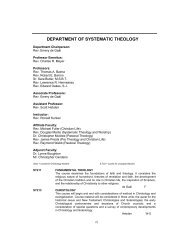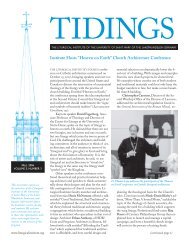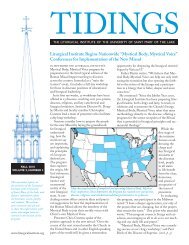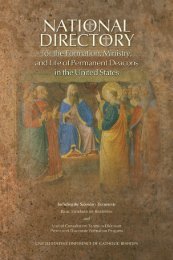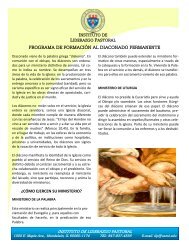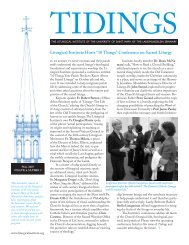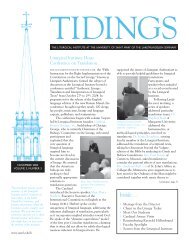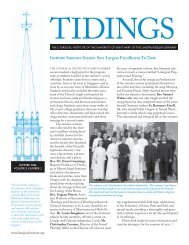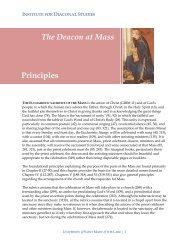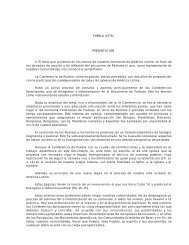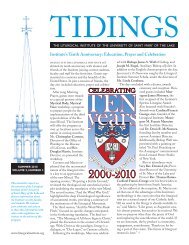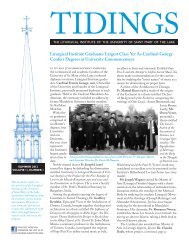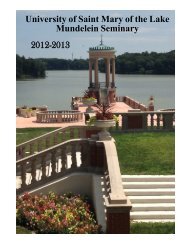Seminary and Graduate School of Theology - Mundelein Seminary
Seminary and Graduate School of Theology - Mundelein Seminary
Seminary and Graduate School of Theology - Mundelein Seminary
You also want an ePaper? Increase the reach of your titles
YUMPU automatically turns print PDFs into web optimized ePapers that Google loves.
PH103<br />
PH104<br />
PH105<br />
PH106<br />
PH107<br />
NATURAL THEOLOGY<br />
This is a course in the basic metaphysical questions concerning reality <strong>and</strong> the<br />
principles in terms <strong>of</strong> which reality can be coherently explained. It also considers<br />
the reality <strong>of</strong> God: His existence, nature, <strong>and</strong> relationship to the world; the<br />
question <strong>of</strong> evil, faith <strong>and</strong> reason. Students review both classical explanations<br />
<strong>and</strong> modern critiques. (Year II)<br />
de Gaál F<br />
ETHICS<br />
This course examines norms for human action, their nature, possibility <strong>and</strong><br />
foundation, <strong>and</strong> discusses: the role <strong>of</strong> values in moral decision-making, theories<br />
<strong>of</strong> ethics, the good, virtue, the moral nature <strong>of</strong> society, <strong>and</strong> spiritual ethical issues.<br />
(Year I)<br />
Kricek<br />
W<br />
MEDIEVAL PHILOSOPHY I<br />
This course examines a selection <strong>of</strong> authors who helped shape the Medieval<br />
period, especially St. Augustine. Other writers who will be considered include:<br />
Pseudo-Dionysius, John Scotus Eriugena, Anselm, Avicenna, Averroës,<br />
Bonaventure, <strong>and</strong> the Franciscans. (Year I)<br />
de Gaál S<br />
MODERN PHILOSOPHY<br />
This course analyzes the thought <strong>of</strong> the great philosophical figures <strong>of</strong> the early<br />
modern period. We shall examine selections from Descartes, Spinoza, Hume,<br />
Leibiniz Kant, <strong>and</strong> Hegel. Major themes to be explored include the turn to<br />
subjectivity, the rise <strong>of</strong> the empirical method, pantheism <strong>and</strong> deism, the critical<br />
problem, <strong>and</strong> idealism. There will be a special emphasis on the explicitly<br />
religious thought <strong>of</strong> the thinkers under consideration. (Year II)<br />
Rugen<br />
W<br />
PHILOSOPHY SEMINAR I<br />
The Seminar covers a variety <strong>of</strong> issues: philosophical methods, writing skills,<br />
research, the development <strong>of</strong> personal philosophy; philosophy <strong>and</strong> theology.<br />
(Year I) (2 credits)<br />
Belauskas F<br />
PH108<br />
PH109<br />
PH110<br />
HUMANITIES I<br />
A study <strong>of</strong> rhetoric <strong>and</strong> the richness <strong>of</strong> language. Concentrated study <strong>of</strong> various<br />
important writers in literature <strong>and</strong> poetry. (Year I)<br />
Oakes<br />
S<br />
PHILOSOPHY SEMINAR II<br />
(Year II) Belauskas S<br />
POLITICAL AND SOCIAL PHILOSOPHY<br />
The course considers both classical <strong>and</strong> modern views on the nature <strong>of</strong> society<br />
<strong>and</strong> government. Related themes are: justice, law, rights, culture, history,<br />
pluralism, religion <strong>and</strong> the state, democracy. The Church's social documents also<br />
are studied in order to identify philosophical ideas at work within these important<br />
writings. (Year II)<br />
Belauskas W<br />
61



